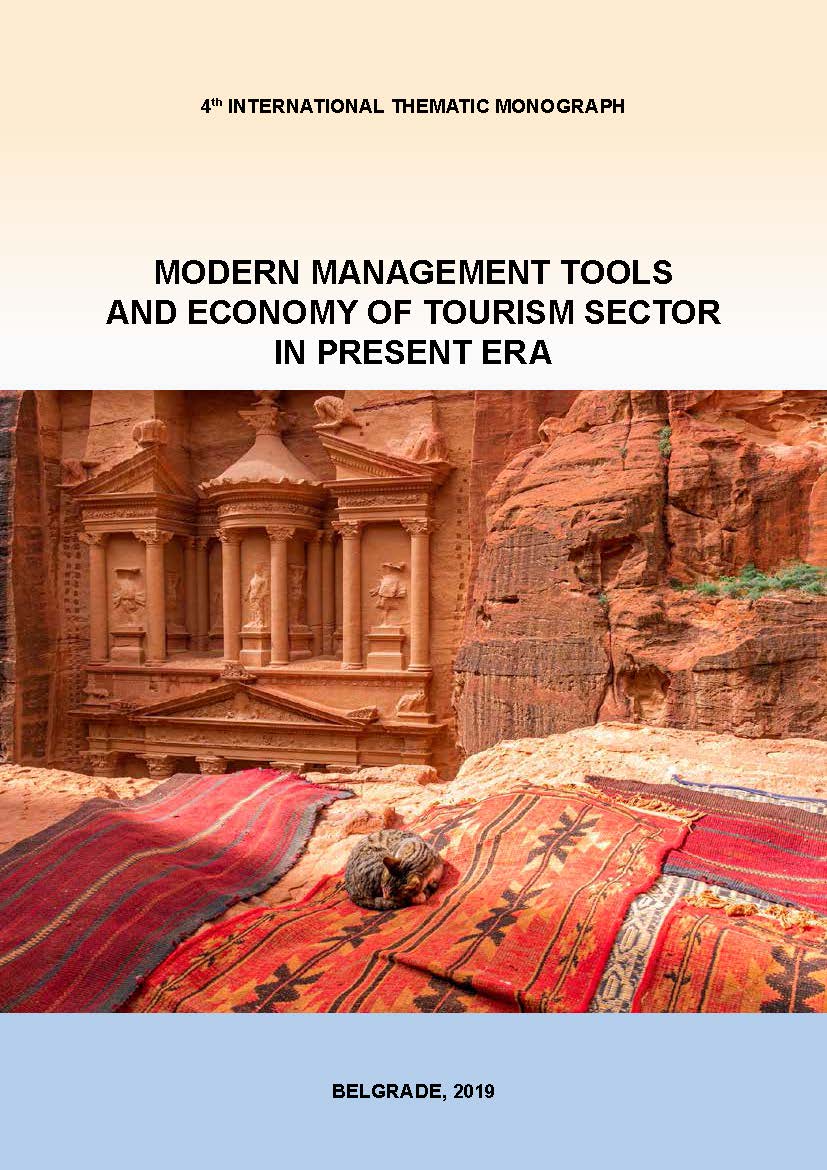|
THE IMPACT OF ICT ON HOTEL OPERATIONS: CASE OF HOTELS IN BOSNIA AND HERZEGOVINA Sabina Đonlagić Alibegović Faculty of Economics, University of Tuzla, Univerzitetska 4, 75000 Tuzla, B&H Amila Karalić Hotel President, Magistralni put A224, Zivinice, B&H DOI: https://doi.org/10.31410/tmt.2019.655 4th International Thematic Monograph - Modern Management Tools and Economy of Tourism Sector in Present Era, Belgrade, 2019, Published by: Association of Economists and Managers of the Balkans in cooperation with the Faculty of Tourism and Hospitality, Ohrid, North Macedonia; ISSN 2683-5673, ISBN 978-86-80194-29-5; Editors: Vuk Bevanda, associate professor, Faculty of Social Sciences, Belgrade, Serbia; Snežana Štetić, full time professor, The College of Tourism, Belgrade, Serbia, Printed by: SKRIPTA International, Belgrade
|
|
Abstract: Technological development and ICT have been recognized as one of the main factors of changes in business and enterprise management. The impact of ICT in tourism has been recognised as one of the main drivers changes in the past several years. This chapters seeks to provide insight into influence of ICT on tourism and impact of ICT utilization on operations in hotels. The chapter is based on research which has been conducted among hotels and hotel managers in Bosnia and Herzegovina aiming to determine the level of ICT utilization and its impact on hotel operations and performance. The results indicate that ICT has contributed to changes in behaviour of guests as well as operations in hotels and their business performance. Keywords: tourism, hotels, ICT, organizational changes, business operations. REFERENCES Aleksić, A. (2009). The role of organisations´ change management in building company´s sustainable competitive competence, Zbornik Ekonomskog fakulteta u Zagrebu, 7(2), 37-47, Faculty of Economics in Zagreb, https://hrcak.srce.hr/index.php?show=clanak&id_clanak_ jezik=69015, Armendia Muneta, M.E. & Ollo-Lopez, A., (2013). ICT impact on tourism industry, International Journal of Management cases, 15(2),87-98 Boban, M. & Babić, A. (2014). Uticaj internetskih tehnologija na gospodarski rast, poslovni rezultat i stopu rasta profita preduzeća u republici Hrvatskoj. Zbornik radova Veleučilišta u Šibeniku, 1(2), 59-82 Barjaktarović, D., & Pindžo, R., (2016). Savremeni trendovi u razvoju hotelijerstva. Turističko poslovanje, 18, 5-16 Bedeković, V., & Golub, D. (2011). Suvremeni menadžment u uvjetima globalnog poslovanja. Praktični menadžment: stručni časopis za teoriju i praksu menadžmenta, 2 (2). Belak, S., & Ušljebrka I. (2014). Organizational culture as a factor in the successful implementation of organizational change. Oeconomica Jadertina, 4(2). Benazić, A. (2014). Uticaj organizacijskih promjena i organizacijskog smanjenja na profesionalizam službenika u državnoj upravi, Croatian and Comparative Public Administration, 14(3), 671-702, https://hrcak.srce.hr/129760 Črnjar, M. (1997). Economy and environmental protection, Zagreb: Školska knjiga, Daft, R. (2010). Organization Theory and Design. USA: South Western Cengage Learning. Đokic-Pešić, S., & Đokić, I. (2010). Kaizen projects in seven steps. Festival kvaliteta, Mašinski fakultet Kragujevac, http://www.cqm.rs/2010/pdf/37/33.pdf, Golja, T. (2009). Percepcija menadžera o važnosti implementacije nažela održivog razvoja u poselovne strategije hotelskih preduzeća-slučaj velikih hotelskih preduzeća u Istri, Ekonomska misao i praksa,13(1), 3-15 Holt, D., Armenakis, A., Feild, S.,Harris S. (2008). Readiness for organizational change: The systematic development of a scale. Boston: Sage publications Madžar, D. (2018). Organizacijska kreativnost i konkurentska prednost poduzeća u turizmu i ugostiteljstvu. Phd Thesis, Rijeka: Fakultet za menadžment u turizmu i ugostiteljstvu Opitzz W., (1998). Globalisierunng und Tourismus. Tourismus hospitality management, 4 (1), 187-191 Pavia N., (2006). Hotel management and Ecological Environment, paper presented at 18th Biennial International Congress Tourism and Hospitality Industry 2006: New trends in tourism and hospitality management, Faculty of touristic and hotel management, Opatija, 2006, pp.1188-1193 Penava, S., & Šehić, J. (2014). Utjecaj organizacijskih promjena na pojavu otpora od strane zaposlenika, Ekonomski pregled, 65(6), 576-597, https://hrcak.srce.hr/132920 Robbins, S. P., & Judge, T. A., (2009). Organizational behaviour. Zagreb: Mate Ltd. Sikavica, P. (2011). Organization. Zagreb: Školska knjiga. Sikavica, P., Bahtijarević-Šiber, F., Pološki Vokić, N. (2008). Temelji menadžmenta. Zagreb: Školska knjiga. Stojanović, J. (2014) Contemporary tendencies in tourism. paper presented at SINTEZA 2014 International scientific Conference University Singidunum: E-Business in tourism and hospitality industry, Belgrade, 2014 http://portal.sinteza.singidunum.ac.rs/Media/ files/2014/738-742.pdf, pp. 738-742 Velagić, I. (2011). Direktna strana ulaganja u turizam Bosne i Hercegovine. paper presented at Conference „Tourism in function of local development”, 2011, Fojnica, pp.45-60 Vuković, I. (2006). Modern trends in the development of tourism within European Union and their implications upon Croatia. Tourism and hospitality management, 12(1), https://hrcak. srce.hr/61770 Žilić, I. (2006). Business excellence in highly categorized hotels- case of Croatia. Ekonomska misao i praksa, 1, https://hrcak.srce.hr/83765
| |||||||
Association of Economists and Managers of the Balkans
- UdEkoM Balkan -
179 Ustanicka St, 11000 Belgrade, Republic of Serbia
E-mail: [email protected]
www.udekom.org.rs
- UdEkoM Balkan -
179 Ustanicka St, 11000 Belgrade, Republic of Serbia
E-mail: [email protected]
www.udekom.org.rs
Tel. +381 62 812 5779
VAT number: 108747027
Registration number.: 28157347
Registration number.: 28157347


